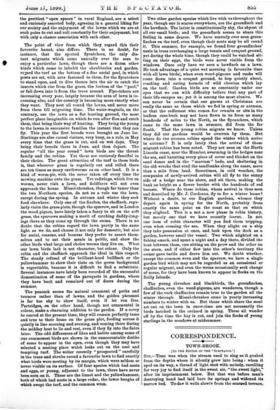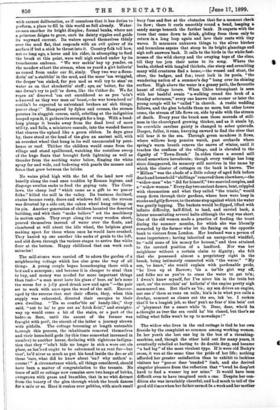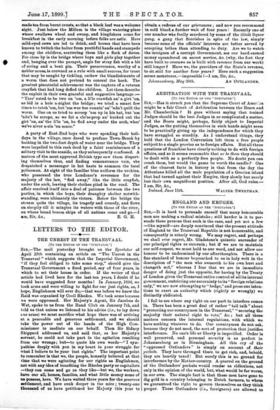CORRESPONDENCE.
TOWN-BROOK.
[To THE EDITOR OF THE "SPECTATOR."] Sire,—Time was when the stream used to sing as it gushed from the depths where it silently grew into being : when it sped on its way, a thread of light shot with melody, carolling for very joy to find itself in the sweet air, "the sweet light," after its imprisonment below. But that was before man's destroying hand had laid bare its springs and widened its narrow bed. To-day it wells slowly from the scarped terrace,
with earnest deliberation, as if conscious that it has duties to perform, a place to fill in this world so full already. Water- er, saes smother its bright dimples; formal banks, where not a primrose deigns to grow, curb its dainty ripples and guide its wayward current. Its waters spread themselves thinly over the mud flat, that responds with an evil quiver of its surface if but a stick be thrust into it. Country folk tell how, not so long ago, a horse and his rider, in attempting to ford the brook at this point, were well nigh sucked under by its treacherous embrace. "We wur mekin' bay up yonder, on the meadow athert the stream, when us yeard a girt hollerin' as corned from under our fit, simly. They two wur a-floun- derin' an' a-stabblin' in the mud, and the moor 'urn wriggled, the deeper 'urn oinked, fur you med as well try to stan' on water as on that shnckettin' stuff ; aye, an' better, fur the one dwun't try to pull 'ee down, like the t'other do. We fot ropes an' draewed 'urn out smnddered so as you 'udn't a-knawed as they wur man an' beast,—he war town-bred an' couldn't be expected to un'erstand brukses an' sich things, poo-er chap !" Hampered by dykes and cresses, the stream pursues its sluggish course, until, rebelling at the indignities heaped upon it, it gathers its strength for a leap. With a head- long plunge it breaks away from the dead level of mere utility, and falls, a miniature cascade, into the wooded fissure that cleaves the upland like a green ribbon. In days gone by, there stood at the head of the glen an ancient mill, with an overshot wheel that hung in its well unconcealed by pent- house or roof. Thither the children would come from the village and stand spellbound, watching the resistless sweep of the huge floats that brought forth lightning as well as thunder from the seething water below, flinging the white splay far and wide, and bedewing with pearls the mosses and ferLs that grew between the bricks.
No wains piled high with the fat of the land now roll heavily along the road once trodden by Roman legions, and disgorge swollen sacks to feed the gaping vats. The Corn- laws, the cheap loaf "which came as a gift to we poo-er folks," killed the mill in the valley. Its business declined, chains became rusty, doors and windows fell out, the stream was diverted by a side cut, the oaken wheel hung rotting on its pin. Another generation of children haunted the deserted building, and with their "make believe" set the machinery in motion again. They crept along the crazy wooden shoot, poured themselves instead of water over the floats, and clambered at will about the idle wheel, the helpless giant making sport for those whom once he would have crushed. They hauled up one another like sacks of grain to the loft, and slid down through the various stages to arrive fine white flour at the bottom. Happy childhood that can work such miracles !
The mill-stones were carried off to adorn the garden of a neighbouring cottage which has also gone the way of all things. A young couple began housekeeping there with a bed and a saucepan ; and because it is cheaper to steal than to buy, and money was needed for more important things than fuel—" a man must have his glass o' beer, an' he's none the worse fur a jolly good drunk now and agen "—the pair set to work with axes upon the wood of the mill. Encour- aged by the success that met their efforts, they, when this supply was exhausted, directed their energies to their own dwelling. 'Tie sa comfer'ble an' handy-like," they said, " not to ha' to goo out an' fetch firin'," and straight- way up would come a bit of the stairs, or a part of the bedro, m floor, until the ascent of the former was fraught with peril, the circuit of the latter a journey strewn with pitfalls. The cottage becoming at length untenable turoogh this process, the inhabitants removed themselves and their household gods (by this time somewhat increased in numb'r) to another house, declaring with righteous indigna- tion that they "'udn't bide no longer in sich a wore out ole place, as lan'lerd ought to be ashummed to ax rent fur—but they', he'd niver sa much as put his head inside the doo-er all these 'ears, what did he knaw about '❑n ? why nothen' a- coorse !" A circumstance which, all things considered, should have been a matter of congratulation to the tenants. No trace of mill or cottage now remains save two heaps of brinks, overgrown with grass and brambles, that in no whit detract from the beauty of the glen through which the brook dances for a mile or so. Here it rushes over pebbles, with much small
busy fuss and fret at the obstacles that for a moment check its flow; there it curls smoothly round a bend, heaping a
sandy marge beneath the further bank. It coquets with the trees that come down to drink, gliding from them only to return in a long loop again and lave their roots with tiny waves. It murmurs unknown things to the silver birches and tremulous aspens that stoop to its bright glancings and sigh soft answers back. It calls to the birds in the white fast- nesses of the wild cherry and the swaying tops of the elms, till they too join their notes to its song. Where the banks, clothed with tangled thickets, rise steep and crumbling many wild creatures find a home,—the weasel and stoat, the otter, the badger, and fox; trout lurk in its pools, "the wandering nation of a summer's day " hang over its shining surface. High above the water is a grassy path, the favourite haunt of village lovers. When Chloe triumphant is seen with her bashful swain "a-walking round the bruk of a Sunday arternoon," every one knows that sooner or later the young couple will be " called " in church. A rustic wedding follows, and the glen beholds them no more, but other lovers come, the stream of life flows on, side by side with the stream of death. Every year the brook sees those mounds of still- ness in the churchyard growing thicker, and as it steals by, its erstwhile careless gaiety is changed to sober quietude. Deeper, fuller, it runs, hurrying onward to find the river that will bear it to the sea. Through green meadows it flows, where willows keep pensive watch, past orchards where spring's warm breath renews the snows of winter, until it reaches the confines of the village, and is elevated to the dignity of " Town-Brook." In olden times a second mill stood somewhere hereabouts; though every vestige has long since disappeared, its memory still survives in the name by which the cluster of cottages on the bank is known. The " Millam" was the abode of a little colony of aged folk before deathand household " shiftings " removed them elsewhere,—the "widow-man" who " did for himself," two married couples, and a " widow-woman." Every day two ancient dames, bent, crippled with rheumatism and what they called "the triatic," would creep down through their gardens, where bees were busy in stocks and giily flowers, to the stone step against which the water was gently lapping. The buckets would be dipped, lifted with infinite difficulty, half-filled, to land, and carried back, labour necessitating several halts although the way was short. One of the old women made a practice of feeding the trout during the summer months, for which she was liberally rewarded by the farmer who let the fisning on the opposite bank to visitors from London. Her husband was a person of some importance ; having inherited an unexpected windfall, he " sold some of his money for housen," and thus attained to the coveted position of a landlord. Nor was her neighbour without a certain claim to dignity ; she felt that she possessed almost a proprietory right in the brook, being intimately connected with " the water." "My son, 'ee knaw," she would explain with pardonable pride, "he lives up at Barrow; 'tis a ter'ble girt way off, and folks sez as you've to crass the water to get to'n; I dwuu't knaw myself, fur I've niver bin in the train but onct, an' the screechin' an' hollerin' o' the engine pretty nigh mammered ma. But that's as 'tis ; my son drives an engine, not one o' them as runs on rails; his'n is in what you calls a drudge, snmmat as clanes out the sea, ink 'ee. I reckon that'll be a longish job, so ther' yen't no fear o' him bein' out o"ployment fur a smart while 'it. Dear, dear, who'd ha a-thought as iver the sea could ha' bin claned, but tiler's no telling what folks wun't be up to nowadays ! "
The widow who lives in the end cottage is tied to her own fireside by the complaint so common among working women. In her youth she lost one leg in the box of a thrashing- machine, and, though the other held out for many years, it eventually rebelled at having to do double duty, and became "a bad leg" of the most virulent type. If it were old Becky's cross, it was at the same time the pride of her life; nothing afforded her greater satisfaction than to exhibit to luckless visitors her " poo-er dear 'ounded " limb, and she derived singular pleasure from the reflection that "'twud be desp'ert hard to find a wusser leg nor mine." It would have been difficult even to have imagined such a one. Despite her con- dition she was invariably cheerful, and had much to tell of the good old times when her father earned 5s. a week and her mother made tea from burnt crusts, so that a black loaf was a welcome sight. Just below the Millam is the village watering-place where swallows wheel and swoop, and kingfishers come for breakfast in the early morning before folks are astir. Here mild-eyed cows are led to drink, and horses that have been known to twitch the halter from youthful hands and stampede among the children, scattering them like a flock of doves. For close by is the bridge where boys and girls play together and, hanging over the parapet, angle for stray fish with a bit of string and a bent pin. Their perseverance, worthy of a nobler cause, is crowned as a rule with small success, for trout that may be caught by tickling, eschew the blandishments of a worm that does not pretend to conceal the hook. The greatest piscatorial achievement was the capture of a veteran crayfish that had long defied the children. Let them describe the exploit in their own graceful and suggestive language :— " Thee listed to be two on 'um, a li'le crawfish an' a girt 'un, as bid in a hole a-nighst the bridge ; we tried a smart few times to catch 'um, but 'urn wur too cunnin' an"udn't quilt the worm. One on us tried to scroop 'um up in his hat, but 'um 'udn't be scrope, so we fot a clo'se-prop an' hucked out the girt 'an, an' the li'le 'an, he flod away under the arch, wher'
we've niver a-sin sence."
A party of East-End boys who were spending their holi- days in the village, once dared to profane Town-Brook by bathing in the two-foot depth of water near the bridge. They were impelled to this rash deed by a faint reminiscence of a solitary visit to the seaside, as they subsequently confessed. A matron of the most approved British type saw them disport- ing themselves thus, and finding remonstrance vain, she despatched a messenger in hot haste to summon the local policeman. At sight of the familiar blue uniform the urchins, who possessed the true Londoner's reverence for the majesty of the law, "flod away," like the little crayfish, under the arch, leaving their clothes piled in the road. The affair resolved itself into a duel of patience between the two parties, in which the boys, their draughty shelter notwith- standing, were ultimately the victors. Below the bridge the stream quits the village, its tragedy and comedy, and flows on sleepily till it mingles its waters with those of the river, on whose broad bosom ships of all nations come and go.—I








































 Previous page
Previous page